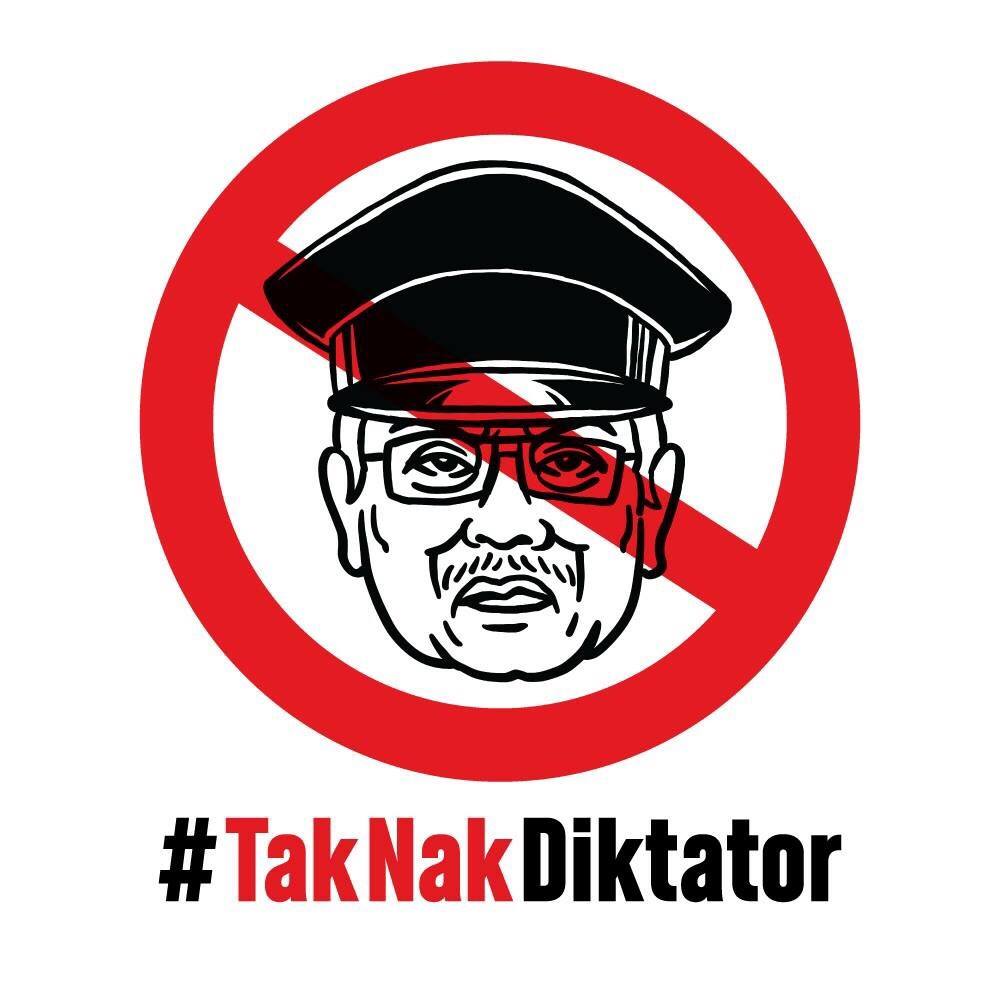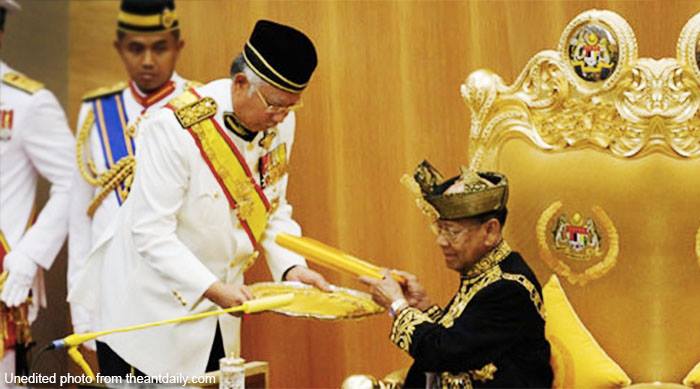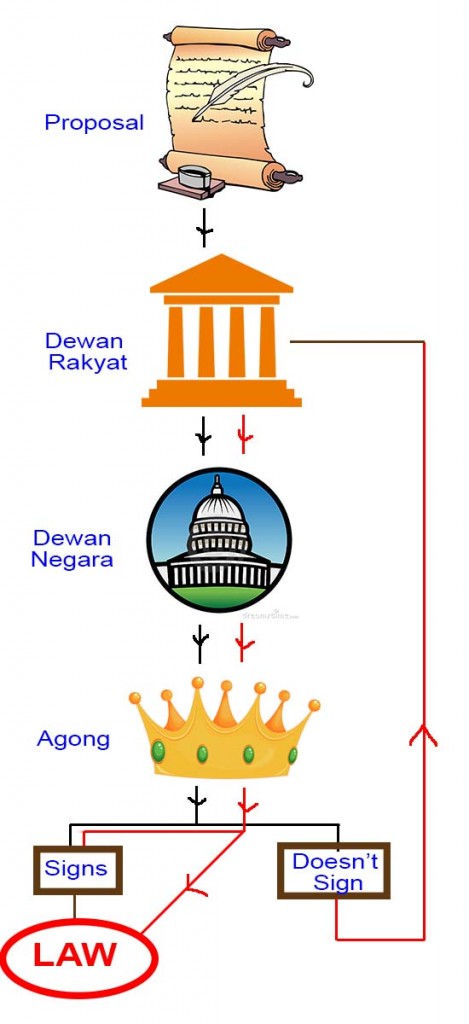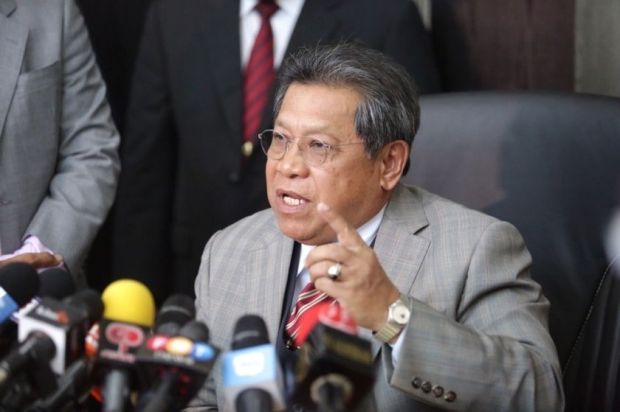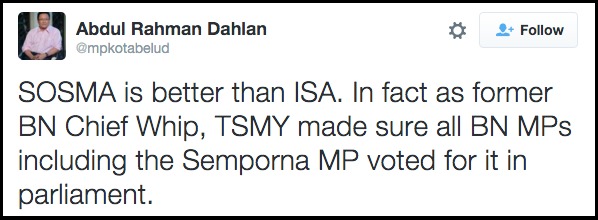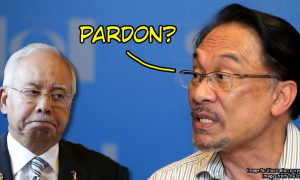How did the Malaysian Parliament pass the “Dictator Bill”?
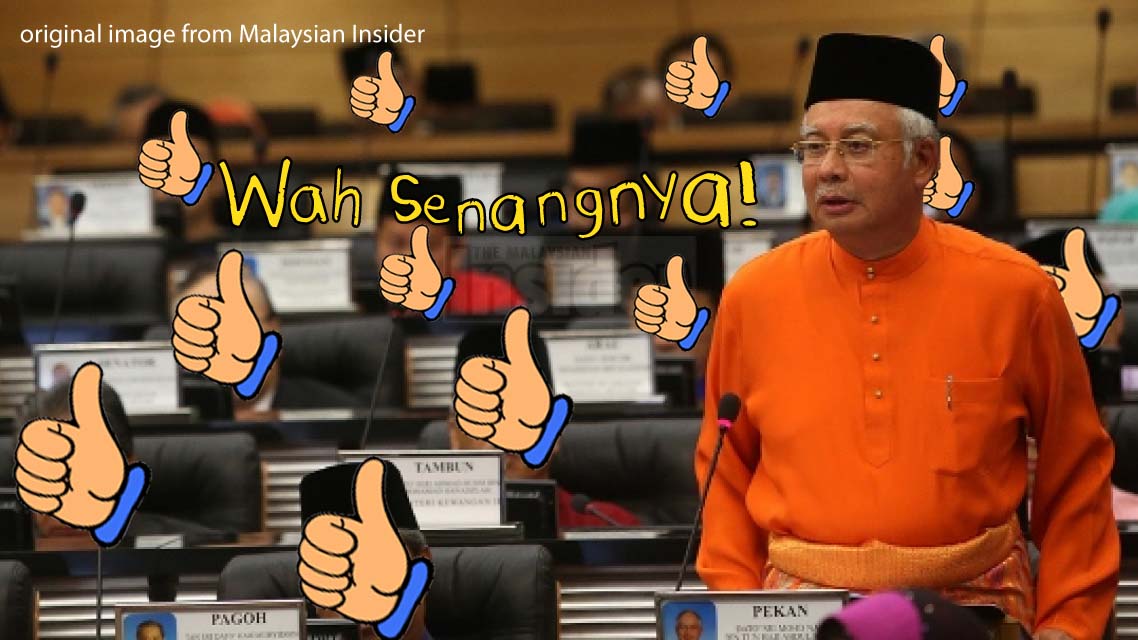
- 1.4KShares
- Facebook1.4K
- Twitter4
- LinkedIn1
- Email1
- WhatsApp10
*Artikel ni ada dalam Bahasa Melayu, tekan sini untuk baca!
The “Dictator Bill” is what many Malaysians are now calling PM Najib’s new National Security Council (NSC) Bill. If you wanna know why it’s been compared to something Kim Jong-Un or Hitler would come up with, you can read our article on it here. Otherwise, the TL;DR version is that it gives the Prime Minister the power – without exaggerating – to take everything away from you. It’s even started a movement:
But after the “Aiyoh” and “Time to migrate” statements, the next statement that usually comes up is “How the heck did Parliament approve this?”. Well, that’s the question we’re gonna try to answer. But before that though, we first need to know how the Malaysian Parliamentary system works (we’ll make it easy, we promise), so we spoke to Ooi Heng from Kajian Politik Untuk Perubahan and Azira from UNDI Malaysia. And for one thing, we found out that…
Najib can’t use the NSC Bill cause it’s not a Law yet
So yea, a BILL and a LAW aren’t the same thing. A “Bill” is basically a proposal that is made to Parliament to make a new law or change an existing one. We don’t know why it’s called a “Bill” but it’s probably because in the end, the Rakyat pays for it. That was a joke. Ha-ha.

Screencapped from Twitter.
We’ll go through the specifics in the next point, but the basics you’ll need to know is that a Bill will have to pass through three main stages:
- Dewan Rakyat – This is the “first level” of Parliament, where the MPs that you vote for meet and discuss Bills. There are currently 222 members including the Prime Minister.
- Dewan Negara – This is the “next level” of Parliament. The members are elected by the political parties and by the Agong. There are currently 70 members.
- Agong – The Agong is the final stage of the process. His signature is technically required for a Bill to become law.
And even after the Agong signs it, this new Law can’t take effect until it gets published in a Gazette, which is like a government’s official fan magazine for announcements.
This is kinda like a mash-up of the Westminster parliamentary system that we inherited from the British but with changes made between the British and the Malayan parties to come up with a framework (the Federal Constitution) that suited national and cultural interests at the time. You can read more on it here if you’ve forgotten your Sejarah classes or want a more detailed story.
So while it seems there are at least three points in which someone would have said “Errr… I don’t think this law is a good idea,” and stopped a Bill from being approved, the reality is that…
1. They don’t actually NEED the Agong’s signature to turn it into Law
According to Azira, the logic of requiring the Agong’s signature to pass a Bill is because an Agong is kinda like the counter-balance to political parties, preventing them from doing questionable stuff in order to stay in power since He’s seen as the incorruptible and principled guardian of the rights of Malaysians.
However, thanks to Mahathir’s little disagreement with the Royalty in 1983, Mahathir amended the Federal Constitution to only allow Agongs to delay the passing of a Bill – essentially, the Agong cannot reject a Bill.
We made the image above to hopefully make it easier to understand, but as a Bill makes its way through the Dewans (The BLACK line) and reaches the Agong, he can either sign it or not sign it. If he doesn’t sign it within 30 days, the Bill will be sent back to the Dewan Rakyat, where it’ll repeat the process again (the RED line). This time though, if the Agong STILL doesn’t sign it within 30 days, it automatically becomes Law.
But of course, we can’t place all the blame at this stage, since the Agong is the final safeguard. So what goes wrong in the beginning?
2. Bills get rushed through the Dewan Rakyat

In the Dewan Rakyat, a Bill has to go through three-and-a-half readings before MPs can vote on it.
- The First Reading is kinda like an introduction to the Bill,
- The Second Reading is where the Bill is debated and discussed. This is also where amendments (changes) can be suggested, or that the Bill is referred to a Special Committee (We’ll elaborate in a bit).
- Otherwise it goes to the Third Reading where only minor amendments are proposed – such as to correct typos. Here’s a graphical breakdown:
MPs will vote for the bill through each step of the process, and if there are too many accepted amendments or if it doesn’t pass the vote it’ll be considered as failed. You can read the in-depth explanation here.
You might notice that there’s no timeline for any of these Readings, cause here’s the clinker – these Readings need time. Much like how the Prevention of Terrorism Act (POTA) was passed, discussions on the NSC Bill was said to be rushed and premature, like a disappointing first date.
In what PKR MP N. Surendren calls “legislation by ambush“, the NSC Bill’s first reading was scheduled on December 3rd and was passed at 4am on December 4th – the last day of the Parliament meet. This means that the entire process was essentially completed in a day. We asked Ooi Heng and Azira if it was normal for second and third readings to happen on the same day and this is what they had to say:
“Yes. It’s normal under our system.” – Ooi Heng, in interview with CILISOS.
“In other Commonwealth or Westminster nations, no. In the UK, it would lead to the Prime Minister or the Cabinet to tender their resignations.” – Azira, in interview with CILISOS.
Now, over to Dewan Negara…
3. Our Dewan Negara Senators aren’t independent (when they’re supposed to be)
The Dewan Negara was also inspired by the Westminster system and was set up to make sure that political parties have another level of checks and balances. It’s for this reason that the representatives (Senators) in Dewan Negara operate a little differently from Dewan Rakyat:
- They aren’t voted in, but rather appointed by the Agong and/or the state government
- They don’t need to be from a political party
- There are two Senators from each state, except Federal Territories.
- Federal Territories get one seat each, appointed by the Agong
- Each Senator can serve 3 years max, for a maximum of 2 times. So up to six years in total. (can we do this for PM too? plsplspls)
- Senators aren’t affected by political shifts. Even when Dewan Rakyat MPs lose their posts (like during elections), Senators still stay on.
The logic is that this independence should allow them to perform their duties without being influenced by party politics. This is a super-simple explanation so you should read more on the details and history here.
HOWEVER then a whole bunch of AMENDMENTS came in to the Federal Constitution, and basically made everything above almost redundant.
- The addition of 40 members (!) selected based on their contributions in the professional or social service fields
- These are elected by the Agong at the advice of the Prime Minister
- The number of Senators have gone from 16 (Original) to 27 (After Sabah and Sarawak joined) to 70 (Current). We didn’t have time to track the dates at which this happened.

Party representation in Dewan Negara. Blue = UMNO, Grey = Independent, Dark Grey = Other parties, Red = DAP, Green = PAS, Light Blue = PKR. There are 3 empty seats. Image from Wikipedia Commons.
So now we got some problems. 40 senators appointed at advice of PM?! This implies that they are either indebted or dependent on the PM for their position. Add to that the 15 Senators of various states which BN won, and as of time of writing, 55 out of the 70 Senators are aligned to BN, with 36 of them appointed by the Agong.
These amendments are, in the words of a former Lord President of the Federal Court:
“…contrary to the spirit of the original constitution which established the Dewan Negara specially as a body to protect in the federal Parliament, state interests against federal encroachments” – Tun Mohamed Suffian Mohamed Hashim, as quoted in a study by IDEAS.
Another problem is that the Dewan Negara cannot actually throw out Bills. They can only recommend amendments and send it back to Dewan Rakyat. This can only be done for up to one year before the Bill automatically gets sent to the Agong.
To be fair, many of these issues are linked back to the Westminster system’s House of Lords. However, the UK has since recognized the faults in this system and have started a long-term reform of the House of Lords.
4. The Parliament Speaker has wayyy too much power
The Speaker holds a very important position in the Dewan Rakyat because he or she doesn’t only moderate discussions, but also to determine what policies or Bills get discussed, imposing limits on questions to ministers (called Question Time), and calling for votes during Readings, among others.
Now, a noted problem with this British system AGAIN, is that it naturally favors the government, since everything works on a “majority wins” principle. And because the party with more seats controls the government, discussions and votes tend to be one-sided. To counter this, the Speaker is usually a member of the Opposition in the UK. However, in Malaysia, the speaker has always been a member of the ruling party.
The current Speaker, Tan Sri Pandikar Amin Mulia has faced several accusations of bias; including allowing the NSC Bill to pass, and for rejecting Bills by the Opposition.
5. MPs are very obedient

Bloc voting or Block voting- in this case refers to MPs voting according to what their superiors tell them to vote for rather than how they actually feel. Considering that BN already has a strong majority over Opposition in parliament (134 to 88), they’ll get a Bill passed every time as long as everyone plays ball. This has been confirmed at least once when BN strategic communications officer Abdul Rahman Dahlan said that former Deputy PM Muhyiddin made all UMNO members vote for SOSMA, another controversial amendment.
You can read more about the bloc voting issue here.
The announcement of voting results are usually summarized in group numbers (such as “103 to 70”) so there’s not way to tell who voted in favor or against a particular issue. Back in April when POTA was passed, it was noted that only 139 of the 222 MPs were present during the voting, and it was noted by BERSIH that “BN MPs who were absent were presumed to support POTA“. It’s perhaps because of this that the government has decided to not reveal how MPs INDIVIDUALLY voted, or even which MPs were present despite requests for them to do so.
So how can we “fix” Parliament?
While the knee jerk response would be to vote out BN in the next General Elections, the problem lies much deeper than our political parties. The reason why every functioning form government needs two or more different voices is because they’re supposed to keep each other in check. Even if the DAP-PKR-Amanah Opposition takes over the government, they have similar power to go full on crazy with our laws and Federal Constitution if they wanted to.
So our problems here isn’t just in trying to change the parties. We should be changing the system – in what’s usually called Parliamentary reform. If it hasn’t been clear throughout all the points presented so far, most of the power lies within the Dewan Rakyat – laws are presented there first, and only the Dewan Rakyat has the power to withdraw a Bill. So in other words, we gotta exercise our rights as Rakyat!

One thing we can do is to hold our MPs accountable. Because MPs are dependent on our votes, they should be held accountable for the laws that they support. We mentioned that the government doesn’t reveal how MPs voted, but there are groups out there trying to make that information available. Our friend Sze Ming at the Sinar Project had to resort to watching videos of the POTA vote to physically count it herself – which she tells us took 5 hours to do. Here’s a guide on how you can reach out to your MPs.
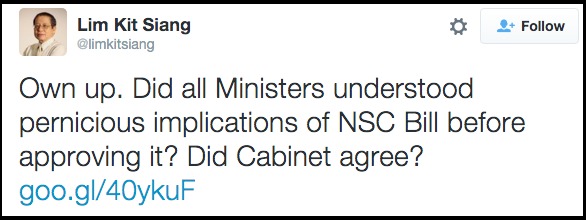
Second, we as the Rakyat should push for a bigger voice in Parliament. Azira tells us that the UK Parliament has an e-petition system where 100,000 signatures will force a debate in Parliament while 10,000 will warrant an official reply to the Rakyat. Perhaps we need to lobby for something similar in the Dewan Rakyat?
We’re not naive enough to suggest that these can be done overnight. In fact, we can’t even tell you how get those in power to implement these changes or even if some of the changes to our Constitution can be undone. However we think that a good starting point would be, again, our MPs. If we can stop a Bill at the Dewan Rakyat level, we’ll have more time to fix everything down the pipeline at a later time.
EXTRA: What you can do to stop the NSC Bill

Image from TakNakDiktator’s Facebook page.
We’ve already addressed this in our NSC article, but since it still hasn’t passed through the senate at the time of writing, we figure we’d post it here as well:
Lawyers For Liberty, SUARAM, and a few other NGOs have also come up with the #TakNakDiktator campaign. To participate, here’s what you can do:
- Use the hashtag #TakNakDiktator on Twitter and Facebook.
- You can use TakNakDiktator campaign images as your profile and/or banner picture. You can get them on facebook.com/taknakdiktator/.
- Sign the Change.org petition. Here’s the link. This will be sent to the 66 senators at Dewan Negara to convince them that it isn’t something that the rakyat wants.
- Post in languages other than English – we need to reach the widest possible audience.
If you wanna go the extra mile, you can also write in to tell your MP how much you disagree with this Bill and/or also remind BN politicians that there’s no guarantee that this Bill won’t affect them unless the NSC is blatant enough to somehow exclude BN politicians (yes they can do that).
Some super semangat Malaysians have prepared a template of a letter you can send to the Senators, along with the emails so you can copy-and-paste instead of typing everything out – All you need to type is the title of your email and your name! Check it out below the line:
How to send email to all senators instantly! (click here)
- 1.4KShares
- Facebook1.4K
- Twitter4
- LinkedIn1
- Email1
- WhatsApp10

